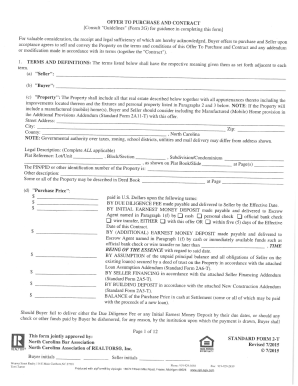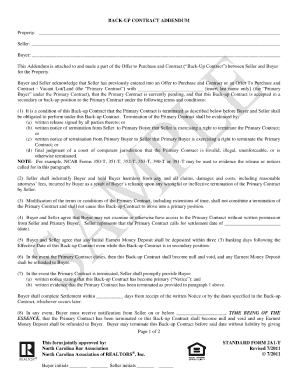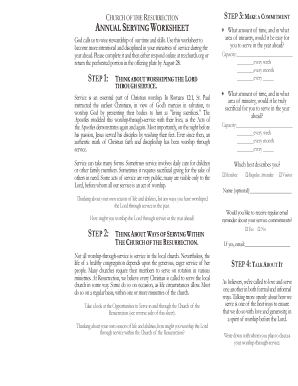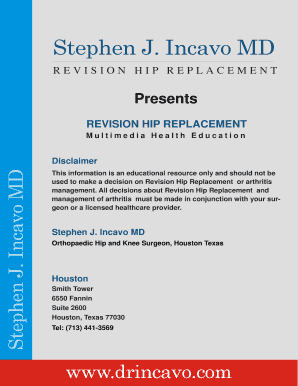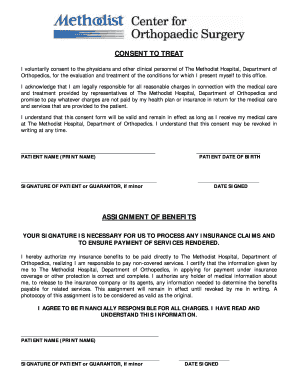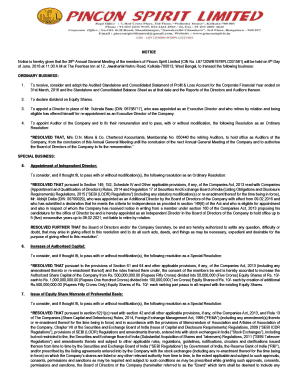
Get the free nc real estate forms
Show details
OFFER TO PURCHASE AND CONTRACT Consult Guidelines (Standard Form 2G) for guidance in completing this form For valuable consideration, the receipt and legal sufficiency of which are hereby acknowledged,
We are not affiliated with any brand or entity on this form
Get, Create, Make and Sign north carolina real estate forms

Edit your north carolina association of realtors forms form online
Type text, complete fillable fields, insert images, highlight or blackout data for discretion, add comments, and more.

Add your legally-binding signature
Draw or type your signature, upload a signature image, or capture it with your digital camera.

Share your form instantly
Email, fax, or share your nc bar association real estate forms form via URL. You can also download, print, or export forms to your preferred cloud storage service.
How to edit nc realtors forms online
Follow the steps down below to benefit from the PDF editor's expertise:
1
Log in. Click Start Free Trial and create a profile if necessary.
2
Prepare a file. Use the Add New button to start a new project. Then, using your device, upload your file to the system by importing it from internal mail, the cloud, or adding its URL.
3
Edit nc realtor forms. Rearrange and rotate pages, insert new and alter existing texts, add new objects, and take advantage of other helpful tools. Click Done to apply changes and return to your Dashboard. Go to the Documents tab to access merging, splitting, locking, or unlocking functions.
4
Save your file. Choose it from the list of records. Then, shift the pointer to the right toolbar and select one of the several exporting methods: save it in multiple formats, download it as a PDF, email it, or save it to the cloud.
Dealing with documents is simple using pdfFiller. Now is the time to try it!
How to fill out nc real estate forms for sale by owner

How to fill out nc real estate forms:
01
Begin by reading the instructions carefully and familiarizing yourself with the specific requirements of the form.
02
Gather all the necessary information and documents needed to complete the form accurately, such as property details, buyer and seller information, financial information, etc.
03
Start by filling out the basic details, such as the property address, buyer and seller names, and contact information.
04
Provide all required information regarding the property, including its legal description, zoning, and any encumbrances or liens.
05
If applicable, complete sections related to financing, including loan details, earnest money deposits, and any contingencies.
06
Fill out any additional sections or disclosures that may be specific to the transaction, such as lead-based paint or seller property disclosure statements.
07
Review the completed form thoroughly to ensure accuracy and completeness. Make sure all required fields are filled, and all supporting documentation is attached.
08
Sign and date the form where required, ensuring all necessary parties have signed the document.
09
Make copies of the completed form for all parties involved in the transaction and keep the original for your records.
Who needs nc real estate forms:
01
Homeowners looking to sell their property in North Carolina.
02
Buyers interested in purchasing real estate in North Carolina.
03
Real estate agents, brokers, and attorneys involved in representing buyers or sellers in North Carolina real estate transactions.
04
Lenders and financial institutions involved in financing real estate purchases in North Carolina.
05
Government agencies and regulatory bodies overseeing real estate transactions in North Carolina.
Fill
nc real estate commission forms
: Try Risk Free
People Also Ask about realtor documents
Can I get my NC real estate license online?
You can take the 75-hour North Carolina real estate broker's course either online or in-person.
Is NC real estate exam open book?
You can take this test on Computer. Kindly note that this is not an open book test.
What is a real estate contract for as is sale in NC?
The term, “As Is,” means that a seller has decided in advance of soliciting offers that he or she will not make any repairs to the listed property. Disclosing this decision to prospective buyers puts them on notice that the seller will not make any repairs regardless of the results of inspections.
What are the requirements for a real estate license in NC?
Requirements to Qualify to Become a North Carolina Real Estate Broker Be at least 18 years old. Be a US citizen, a non-citizen national, or a qualified alien under federal law. Complete a state-approved 75-hour broker prelicensing course. Pass the North Carolina State Licensing Examination with a score of at least 75%.
What is required for real estate license in NC?
Requirements to Qualify to Become a North Carolina Real Estate Broker Be at least 18 years old. Be a US citizen, a non-citizen national, or a qualified alien under federal law. Complete a state-approved 75-hour broker prelicensing course. Pass the North Carolina State Licensing Examination with a score of at least 75%.
What is the format of the NC real estate exam?
The exam is 4 hours & includes 120 questions, of which 80 are National and 40 are State-based questions. The remaining 10-15 questions are unscored, pretest questions.
Our user reviews speak for themselves
Read more or give pdfFiller a try to experience the benefits for yourself
For pdfFiller’s FAQs
Below is a list of the most common customer questions. If you can’t find an answer to your question, please don’t hesitate to reach out to us.
What information must be reported on nc real estate forms?
1. The names of the buyer and seller
2. The property's physical address
3. The purchase price of the property
4. The amount of earnest money being held in escrow
5. The closing date
6. The type of financing used for the purchase
7. The title of the property
8. Any liens, encumbrances or easements
9. The legal description of the property
10. Any applicable deed restrictions or covenants
11. The transfer tax amount, if applicable
12. Any necessary signatures and dates
What is nc real estate forms?
NC Real Estate Forms refer to the standardized contracts and legal documents that are used in the state of North Carolina for buying, selling, renting, or leasing real estate properties. These forms are created and regulated by the North Carolina Real Estate Commission, which is the governing body responsible for overseeing the real estate industry in the state.
The NC Real Estate Forms provide a consistent and reliable framework for real estate transactions and ensure that all parties involved are aware of their rights and obligations. These forms cover various aspects of a real estate transaction, such as purchase agreements, rental or lease agreements, disclosure forms, addendums, and other necessary documents.
Using the standardized NC Real Estate Forms helps in streamlining the process, minimizing disputes or misunderstandings, and ensuring that all legal requirements are met. It is important for real estate professionals, buyers, sellers, landlords, and tenants to be familiar with these forms to navigate the complex landscape of real estate transactions in North Carolina.
Who is required to file nc real estate forms?
In North Carolina, various individuals and entities are required to file real estate forms depending on the specific circumstance. The required individuals or entities may include:
1. Property Sellers: Sellers of residential or commercial real estate in North Carolina may need to file certain forms, such as a Residential Property Disclosure Form, which provides details about the property's condition and any known issues.
2. Property Buyers: Buyers of residential real estate may need to file an Offer to Purchase and Contract form, which outlines the terms and conditions of the purchase agreement.
3. Real Estate Agents: Real estate agents or brokers involved in transactions must file forms such as a Residential Rental Contract, Listing Agreement, or Buyer Agency Agreement, depending on their role and the type of transaction.
4. Landlords: Landlords who rent out residential properties are required to file forms such as a Residential Rental Agreement or Lease Agreement, which outlines the terms and conditions of the rental arrangement.
5. Tenants: Tenants in North Carolina may need to file forms such as a Rental Application, which provides information to landlords during the rental selection process.
It is important to note that specific forms and filing requirements can vary depending on the type of real estate transaction, property, and local regulations. Consulting a real estate professional or attorney is advisable to ensure compliance with all necessary filing requirements.
How to fill out nc real estate forms?
To fill out NC real estate forms, follow these steps:
1. Obtain the required forms: The North Carolina Real Estate Commission website provides a wide range of real estate forms available for download. Identify the form(s) you need for your specific transaction, such as the Offer to Purchase and Contract, Residential Rental Agreement, or Disclosure Forms.
2. Gather necessary information: Collect all the relevant information required for filling out the form(s). This may include the names and contact information of the buyer(s) and seller(s), property address, purchase price, financing terms, inspection details, and any other pertinent information specific to your situation.
3. Read the instructions: Carefully review the instructions or guidelines provided with the form(s) before filling them out. This will ensure that you understand the purpose, requirements, and specific sections of the forms.
4. Complete the form(s): Start filling out the form(s) by entering the requested information in the appropriate fields. Be thorough and accurate, ensuring all required fields are completed and all parties' information is included.
5. Attach additional documents: If any additional documents or attachments are required to be submitted with the form(s), ensure that you have them prepared and attached accordingly. Examples could include earnest money checks, financing pre-approval letters, or addendums specific to the transaction.
6. Review and double-check: Before submitting any documents, thoroughly review the filled-out forms for any errors or omissions. Mistakes or missing information can cause delays or complications, so take the time to carefully review everything.
7. Sign and date: Ensure all necessary parties sign and date the form(s) appropriately. Different forms may require multiple signatures from buyers, sellers, agents, or witnesses. Follow the specific instructions provided for each form.
8. Distribute the forms: Once the forms are filled out correctly and signed, make copies for all parties involved. Distribute the form(s) accordingly to the appropriate individuals, such as the buyer, seller, and their respective agents. Retain a copy for your records as well.
Remember, although these general steps can guide you through the process of filling out NC real estate forms, it's always advisable to seek guidance from a qualified real estate professional or attorney to ensure compliance with relevant laws, regulations, and specific circumstances related to your transaction.
What is the purpose of nc real estate forms?
The purpose of North Carolina (NC) real estate forms is to provide a standardized and legally binding way to document various aspects of a real estate transaction in the state. These forms are designed to protect the rights and interests of both buyers and sellers, as well as other parties involved in the transaction such as real estate agents or brokers.
NC real estate forms cover a wide range of documents, including purchase agreements, sales contracts, lease agreements, disclosure forms, addendums, and various other forms related to financing, inspections, or contingencies. These forms serve as a written record of the terms and conditions agreed upon by all parties involved and help ensure that all necessary information and legal requirements are met during the real estate transaction process.
By using NC real estate forms, all parties can have a clear understanding of their rights, responsibilities, and obligations, reducing the risk of miscommunication or disputes. These standardized forms also ensure compliance with state laws and regulations, provide consistency in documentation across different real estate transactions, and offer a level of protection and transparency for all parties involved.
How can I manage my nc real estate contract forms directly from Gmail?
It's easy to use pdfFiller's Gmail add-on to make and edit your real estate forms nc and any other documents you get right in your email. You can also eSign them. Take a look at the Google Workspace Marketplace and get pdfFiller for Gmail. Get rid of the time-consuming steps and easily manage your documents and eSignatures with the help of an app.
How can I edit nc bar association forms on a smartphone?
The best way to make changes to documents on a mobile device is to use pdfFiller's apps for iOS and Android. You may get them from the Apple Store and Google Play. Learn more about the apps here. To start editing north carolina real estate contract forms, you need to install and log in to the app.
How do I complete forms for selling a house on an Android device?
Use the pdfFiller mobile app and complete your nc form 2 t and other documents on your Android device. The app provides you with all essential document management features, such as editing content, eSigning, annotating, sharing files, etc. You will have access to your documents at any time, as long as there is an internet connection.
Fill out your nc real estate forms online with pdfFiller!
pdfFiller is an end-to-end solution for managing, creating, and editing documents and forms in the cloud. Save time and hassle by preparing your tax forms online.

North Carolina Realtors Association Forms is not the form you're looking for?Search for another form here.
Keywords relevant to nc realtors association forms
Related to nc association of realtors
If you believe that this page should be taken down, please follow our DMCA take down process
here
.















